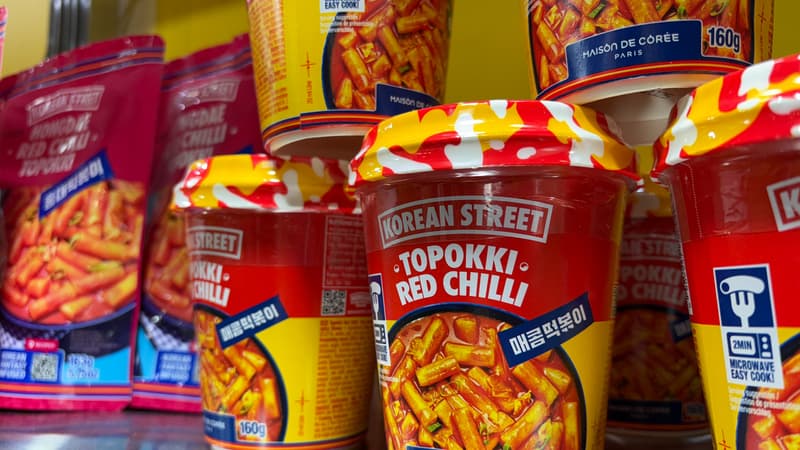HE
Korea is making its way into our closets and refrigerators. Showcase of the global agri-food industry, the International Food Fair (Sial) in Paris will soon close its doors after once again hosting several thousand exhibitors at the Villepinte fairgrounds, in Seine-Saint-Pierre. Every two years, shoppers and manufacturers scour the shops for the next consumer trends, those that will soon fill the shelves of supermarkets around the world. And if there are many essential products for the coming years, they are those of Korean cuisine.
It’s not really a surprise: South Korea shines all over the world. Whether we are talking about music (with the famous “K-pop”), television series, movies, cosmetics – and literature with the recent Nobel Prize –, it is impossible to ignore the Korean wave, which is now winning plaques European. Korean restaurants have multiplied in Europe in recent years and now it is the turn of local cuisine to conquer supermarkets. In the halls of Sial, noodles, sauces, ravioli, cookies and drinks are piled up on the stands of a good hundred companies and arouse some interest among distributors.
When we talk about the success of Korean products, he spontaneously mentions “topokki”, a classic street food dish made up of rice flour sticks coated with a spicy sauce, “which has become our number 1 seller” under the Korean Street brand, one of the brands deployed by the company on European soil. Street food fans, restaurants have led the way in topokki, giving consumers time to try it for the first time and then want to eat it again at home. His appearance in an episode of the first season of the series Squid Game, one of Netflix’s hits, is also no stranger to his sudden popularity.
“Sometimes it’s not easy to get in”
The French company, associated with a sister company in Korea where it manufactures its products, also plays the role of intermediary for the big Korean brands. On the shelves we find Nongshim instant noodles (which appear in the movie Parasite), snacks from the giant Orion and, above all, bottles of Jinro soju (with a market share of 70% in its native country, Jinro is a beverage giant spirits). “We are starting distribution” in its flavored version, but the brand will be more present “in one or two years” in French supermarkets, Sung Sik Kim wants to believe, after having already convinced Carrefour.
In the next room, Milkis bottles are covered with the image of Hello Kitty, the result of an annual commercial partnership between the Japanese character and the soft drink. It is a kind of flavored soft drink to which powdered milk is added. “Many foreign companies have contacted us to sell our products,” confirms Young Duk Kang, team leader for Europe and Russia at Lotte Chilsung Beverage, which is also part of the Lotte conglomerate. Wanting to take advantage of the Korean “boom” to boost its exports, the manufacturer focuses its efforts on European stores, also relying on the younger generations.
The latter brought together 75 companies to fill a large Korean pavilion, two thirds of the national companies present at the Ile-de-France show. Behind the success of “k-food”, we must not hide the role of the Korean State, which has effectively supported the dissemination of Korean culture, including cuisine, through a proactive and concerted policy. [voir encadré]. In addition to its marketing missions, the Paris agency is a contact point for Korean exporting SMEs. The French “like it a lot [nos] products”, but “sometimes it is not easy to enter” the European market, due to the “numerous regulations that have to be followed”, underlines Joohee Choi.
No milk in ice cream bars
Melon ice cream bars have decided to get around the regulatory hurdle. To test the adventure on our side of Eurasia, the dairy products giant Binggrae has decided to modify the recipe of its flagship brand… eliminating milk, convinced of being able to attract mass distribution, as a representative of the company, between two Distribution of ice cream to visitors. Despite the free trade agreement between the European Union and South Korea, it is still difficult to export milk-based food products. In South Korea, these ice cream bars contain skimmed milk: in Europe, it has been replaced by oat or coconut milk.
But the most effective argument remains its Korean origin. “Importers ask us to leave Korean characters on the packaging, not just write in English,” says one at the Melona booth. Without a doubt, the Korean wave is preparing to break into our supermarkets.
In reality, nothing is the result of chance in Korean cultural success, but rather the result of an effective policy carried out by the Korean State since the late 1990s. The efforts of private companies are largely supported by tools institutional, legislative and financial measures deployed. by Seoul, which understood the interest of cultural soft power in stimulating the growth of national companies and giving the country a leadership position at a global level.
State support is “capital” for the dissemination of Korean cuisine, explains Benjamin Joinau, professor of cultural anthropology at Hongik University in Seoul. To get it outside its borders, the South Korean government supported the standardization of recipes, for example in terms of quantities, as well as the translation and distribution of Korean recipe books. “They chose the least typical and most exportable dishes,” he explains.
Seoul has tried to popularize it since the late 2000s, but “it didn’t work immediately,” he adds. The popularity of Korean “pop culture” finally managed to get the ball rolling. In the food market, “Korea arrives at the right time, where Japan’s attraction is losing strength and China is closing in on itself,” contextualizes Benjamin Joinau, also adding a “discovery effect” from which no one benefits. other Asian countries, such as Vietnam.
Source: BFM TV


